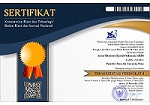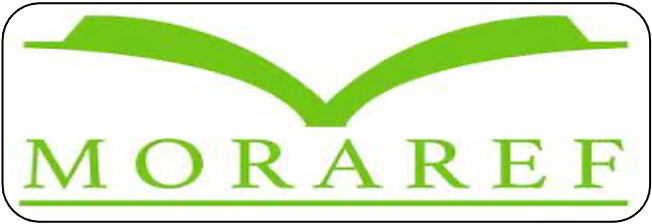Commerce Ethics of Muhammad PBUH’ and Universal Values in Era of Prophet Hood
Abstract
Muhammad PBUH, primarily business along with his father since as early as his childhood. Whilst he grown up, he commenced to setup his own venture and also have a joint venture with Siti Khadijah based on mudharabah scheme. He is gifted with great wisdom in trading and has allowed him gaining great benefit through it. Due to his moral in trading, it leads to his marriage with Siti Khadijah. Unquestionably there were features on the ethics and morals in the trade that Muhammad PBUH has represented. A matter of concern was his morality that shown during trade leads to his marriage with Siti Khadijah who was initially his business colleague previously and what was the commercial strategy that empowers him to a vast profit during trading. Thus, this study endeavor to define and detail the ethics and morals in trading that has been shown by Muhammad PBUH prior his prophet hood. The results of this study display the conflicting fact in practices that has been applied amongst the community back at that time. His is abundant in honest, fairness, friendly and compassionate to the buyer, and never set up a high price, and also detail in transaction record consequential him loved by many people. Alongside the combination of his aptitude in negotiation and intelligence, he was proficient to “read” the market opportunities and learning cultural and geographical conditions of each target market led him to higher profits than other merchants. In addition, this study also articulated sixteen Muhammad PBUH’ universal values in commerce such; honest, trustworthy, fair, polite and affectionate in trade, buy-sell applies only based on mutual consent, not involved in usurious practices', only legitimate and permitted item that will sell, avoid argument with partners and buyers, no oath in the name of idols, hoarding the goodies (ikhtisar) is not allowed, damaged item’ replacement policy, avoid competition on price, small profits is acceptable, pay his employee as soon as the job is done, always record transaction, and be generous. Those ethics and values actually resemble to such practice by Islamic merchants to highlight Islamic values in commerce nowadays.
Keyword: Trading Business Ethics, Muhammad PBUH, prior to prophet hood.
Full Text:
PDFReferences
Abu Hamid Muhammad Ibn Muhammad al-Ghazzali. 1976. Ihya’ Ulum al-Din, Jilid. 3 Kaherah: Muassasah al-Halabi wa Shurakauhu li al-Nashr wa al-Tawzi’.
Abu Muhammad Abdul Malik Ibnu Hisyam ibnu Ayyub al-Humairy. 1995. al-sirah al-nabawiyah, Selangor: Akbar Media Syarah & Tahqiq.
Abdul Ghafar Ismail, et al, 2012. “Krisis Zon Eropah: Kebenaran dan Pengajaran Kepada Sistem Kewangan Islam. Pusat Islam Iskandar, Johor Bahru.
Achmad Charris Zubair. 1995. Kuliah Etika. Jakarta: Rajawali Press.
Adrian Blundell-Wignal. 2012. Solving the Financial and Sovereign Debt Crisis in Europe, OeCD Journal: Financial Market Trend. Vol. 2011-Issue 12.
Afzalurrahman. 2000. Muhammad As a Trader. Jakarta: Yayasan Swarna Bhumy.
Ahmad Munawwir. 1997. Kamus al-Munawwir, Arab Indonesia, 2nd Ed. 14th printed. Jakarta: Pustaka Progresif.
Ahmad Tafsir. 2009. Filsafat Umum Akal dan Hati Sejak Thales Sampai Capra. Bandung: Remaja Rosdakarya.
Alfred Chandler. 1962. Strategy and Structure. Cambridge, Ma: MIT Press.
Anderson, Gary M. 1988. “Mr. Smith and the Preachers: The Economics of Religion in the Wealth of Nation,” Journal of Political Economy, Vol. 96, No. 5.
Anwar Abbas. 2010. Bung Hatta dan Ekonomi Islam; Menangkap Makna Maqhasid al Syariah. Jakarta: Kompas Media Nusantra.
Arif Mulyadi. 2002. Pengantar Filsafat Islam: Sebuah Pendekatan Tematis. Bandung: Mizan, Cet. II.
Carol W. Lewis.1991. The Ethics Challenge in Public Service. California: Jossey-Bass Publishers.
Gunardi Endro. 1999. Redifinisi Perniagaan: Suatu Penggalian Etika Keutamaan Aristoteles. Jakarta: Pustaka Binaman Pressindo.
Heri Sudarsono. 2004. Konsep Ekonomi Islam. Yogyakarta: Ekonosia.
Ibn Kathir. 1980. Tafsir al-Quran al Adhim. Beirut: Dar al Fikr.
Ibnu Manzur t.ht., Lisan al-Arab. Juz ke-5. Hadharah: Dar al-Maarif
Ibrahim Anis, et al. 2001. Mu’jam al-Wajiz: Mesir: Jumhuriyyah al-Misri al-Arabiyyah.
Kamus Dewan. 2002. ed. Ke-3. Kuala Lumpur: Dewan Bahasa Dan Pustaka.
Karen Armstrong. 2007. Muhammad Nabi Zaman Kita. Yogyakarta: Beranda.
K. Berten. 2002. Pengantar Etika Perniagaan. Yogyakarta: Kanisius.
Kenneth Lux. 1990. Adam Smith’s Mistake; How a Moral Philosopher Invented Economics and Ended Morality. New York: Shambhala.
Keraf, Sonny. 1997. Bisakah Bisnis Berjalan Tanpa Moralitas. Yogyakarta: Kanisius, Edisi Khusus.
Keraf, Sonny. 1998. Etika Bisnis, Tuntutan dan Relevansinya. Yogyakarta : Kanisius.
Kwik Kian Gie, dkk. 1996. Etika Bisnis Cina: Suatu Kajian Terhadap Perekonomian di Indonesia, Jakarta : Gramedia Pustaka.
Makalah Anas Khoiruddin dkk. Sejarah Bangsa Arab Pra Islam, diunduh dari www.docstoc.com pada 26 Juli 2011
Makalah Anas Khoiruddin dkk. Sejarah Bangsa Arab Pra Islam, diunduh dari www.docstoc.com pada 24 Februari 2016
M. Abdul Karim. 2007. History of the Muslim Thought and Civillization, terj. Tim Pustaka Book Publisher, Sejarah Pemikiran dan Peradaban. Yogyakarta: Pustaka Book Publisher.
M. Quraish Shihab. 1994. Membumikan al-Qur’an. Bandung: Mizan.
Mohd Nasir Omar. 2005. Akhlak dan Kaunseling Islam. Kuala Lumpur: Utusan Publications.
Moenawar Cholil. 2006. Kelengkapan Tarikh Nabi Muhammad, Jil. 1. Jakarta: Gema Insani Press.
M. Umer Chapra. 2000. The Future of Economics: An Islamic Perspective, Islamic Economics Series: 2, United Kingdom: Tha Islamic Foundation.
Mustafa Haji Daud. 1996. Etika Pengurusan. Kuala Lumpur: Utusan Publication.
Majid Fakhri. 1996. Etika Dalam Islam. Yokyakarta: Pustaka Pelajar dan Pusat Studi Islam-USM.
Muhammad ibn Habib Bagdadi. 1942. al-Muhabbar, Da’irah Al-Ustmanyiyah, Hy-deraba, India: Deccan.
Muhammad bin Yasar ibn Isaac. 2002. Sirah Ibn Ishaq. Surakarta: Muhammadiyah University Press.
Muhammad bin Alwi al-Maliky. 1994. al-Bushrā fī Manāqib al-Sayyidah Khadījah al-Kubrā. Surabaya: Barar al-Tsaqaf,
M. Suyanto. 2008. Muhammad Business Strategy and Ethics. Yogyakarta: Andi Offset
Nor‟Azzah binti Kamri. 2002. Etika Pengurusan Islam dan Konvensional, Suatu Analisis Perbandingan, Jurnal Syariah Vol.10, No. 2.
Oliver Leaman. 1999. A Brief Introduction to Islamic Philosophy. Cambridge: Polity Press
Osman Bakar. The Spiritual and Ethical Foundation of Science and Technology in Islamic Civilization, http://i-epistemology.net/ science-a-technology/845-the-spiritual-and-ethical -foundation - of-science-and-technology-in-islamic-civilization.html
Peter Baelz. 1977. Ethics and Belief. London: Sheldon Press.
Philip K. Hitti. 2002. History oh The Arabs. New York: Palgrave Macmillan
Qairunnisa Khamsa. 2011. Bisnis Tanpa Rugi Ala Rasulullah SWT. Makasar: Arus Timur.
Qardhawi Yusuf. 2003. Norma dan Etika Ekonomi Islam. Jakarta: Gema Insani Press
Rahardjo, Dawan. 1995. “Etika Bisnis Menghadapi Globalisasi dalam PJP II”, Yogyakarta: Prisma.
R. Sims. 2003. Ethics and Corporate Social Responsibility-Why Giants Fall. C.T.: Greenwood Press.
Robin Snell.1993. Developing Skill for Ethical Management. London: Chapman & Hall.
Ronald M. Green. 1994. The Ethical Manager: A New Method For Business Ethics. New York: Macmillan College Publishing Company, Inc.
Rus’an. 1981. Lintasan Sejarah Islam di Zaman Rasulullah SAW. Semarang: Wicaksana.
Sayyed Nasr and Oliver Leaman, 1996. History of Islamic Philosophy. London: Routledge.
Spiegel, H.W. 1991. The Growth of Economic Thought, 3rd ed. Durham, NC: Duke University Press.
Sahih al-Bukhari. 1387H. Muhammad ibnu Ismail al-Bukhari (m.256H). India: Maktabah Rahmaniyyah.
Sahih Muslim. 1376H. Muslim ibnu Hajjaj al-Qurasyi. India: Maktabah Rasyidiyah.
Smith, Adam. 1996. An Inquiry into the Nature and Causes of the Wealth of Nation. New York: The Glasgow Edition.
Smith, Adam. 1982. Theory of Moral Sentiments. Ed. A.L. Macfie and D.D. Rafphael. Indianopolis: Liberty Press.
Sri Nawatmi.2010. Etika Bisnis Dalam Perspektif Islam. Fokus Ekonomi (FE), April 2010, Vol. 9, No.1, ISSN: 1412-3851.
as-Syaikh Taqiyuddin an-Nabhani. 2003. As-Syakhshiyyah al-Islamiyyah al-Juz’ al-Awwal, Dar al-Ummah. Beirut: cetakan Muktamadah.
Syeikh Sofiyurrahman Al-Mubarakfuri. 2013. Sirah Nabi Ar-Rahiq al-Makhtum. Selangor: Kemilau Publika Sdn.Bhd.
Y. Vardi. 2001. The Effects of Organizational and Ethical Climate as on Misconduct at Work, Journal of Business Ethics, Februari 2001, 29,4, ABI/INFORM Global.
Zen Abdurrahman. 2011. Strategi Genius Marketing ala Rasulullah. Jogjakarta: Diva Press.
DOI: http://dx.doi.org/10.21927/jesi.2017.7(1).49-60












